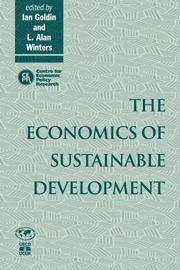Book contents
- Frontmatter
- Contents
- List of figures
- List of tables
- Preface
- Acknowledgements
- List of conference participants
- 1 Economic policies for sustainable development
- PART ONE GROWTH AND THE ENVIRONMENT
- PART TWO SUSTAINABILITY
- 4 What sustains economic development?
- Discussion
- 5 Optimal development and the idea of net national product
- Discussion
- 6 Sustainable growth and the Green Golden Rule
- Discussion
- PART THREE DOMESTIC POLICY
- PART FOUR INTERNATIONAL POLICY COORDINATION
- Index
4 - What sustains economic development?
Published online by Cambridge University Press: 04 August 2010
- Frontmatter
- Contents
- List of figures
- List of tables
- Preface
- Acknowledgements
- List of conference participants
- 1 Economic policies for sustainable development
- PART ONE GROWTH AND THE ENVIRONMENT
- PART TWO SUSTAINABILITY
- 4 What sustains economic development?
- Discussion
- 5 Optimal development and the idea of net national product
- Discussion
- 6 Sustainable growth and the Green Golden Rule
- Discussion
- PART THREE DOMESTIC POLICY
- PART FOUR INTERNATIONAL POLICY COORDINATION
- Index
Summary
Some definitions
The chapter starts (in this section) with an attempt to clarify the meaning of certain concepts relevant to ‘sustained economic development’. It needs to be said that the definitions have been chosen for their analytic convenience, and that they do not have any direct implications for policy. For example, defining income in one way does not imply that it should be kept constant or be made to grow or decline at any particular rate. Definitions are only definitions. It is hoped that the ones given here do help to clarify the issues subsequently discussed, namely, environmental concerns (section 2), the role of government (section 3), and the main conditions for continuing growth in real per capita income (the concluding section 4).
Other chapters in this book are concerned with optimal growth, but my concern is with whether sustained growth is feasible. It has been argued in recent years that the effects of growth on the environment are such that, in the not too distant future, growth must cease. While environmental concerns must be taken seriously they are not, I believe, the most important ones. Nor is another one often mentioned in this context, namely, whether present generations are sufficiently interested in the welfare of future generations. The view that people save and invest only for themselves and not for their descendants is, to my mind, a caricature of the truth (see Scott, 1989: 221–4). Instead, I believe that continuing future development mainly depends on the ability of different nations, and of different groups within nations, to coexist peaceably and to organise collective action effectively.
- Type
- Chapter
- Information
- The Economics of Sustainable Development , pp. 83 - 105Publisher: Cambridge University PressPrint publication year: 1995
- 4
- Cited by



